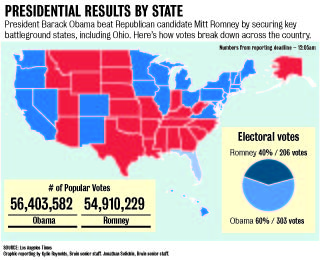President Barack Obama edges out Republican candidate Mitt Romney for second term

By Katherine Hafner
Nov. 7, 2012 2:19 a.m.
President Barack Obama was re-elected to a second term as president of the United States on Tuesday, defeating Republican candidate Mitt Romney in both the electoral and popular votes.
Obama led Romney with 303 electoral votes compared to Romney’s 206, with about 50 and 49 percent of the popular vote, respectively, according to the New York Times as of press time.
Winning the popular vote does not guarantee the presidency ““ a candidate must win the electoral vote to become president. Polls leading up to the election showed a head-to-head race, with Romney and Obama tied at 49 percent of the popular vote, which continued until late Tuesday night..
In 2008, 62,438,115 people voted for Obama ““ a record number of votes for an individual candidate, according to United Press International. Obama defeated Republican candidate John McCain that year by 53 percent to 46 percent of the popular vote, and 365 electoral votes compared to McCain’s 173.
Prior to Tuesday night, Obama had a solid 243 electoral votes in his favor, leading Romney who had 206, according to the New York Times.
A majority of 270 electoral votes are needed to win the presidential election, out of 538 total electoral votes from the 50 states and the District of Columbia. It is possible for two major political party candidates to tie with 269 electoral votes each.
Before the election results came in, Thomas Schwartz, a professor of political science at UCLA, said a tie like this has never happened under the current system, in place since the 1800s.
“There (was) a greater-than-ever-before chance of (a tie) happening this time,” Schwartz said.
In the event of a tie, the House of Representatives would choose the president, and the Senate would vote for the vice president.
Battleground states of New Hampshire, Ohio, Wisconsin, Iowa and Colorado helped push Obama over the 270 mark.
Ground operations ““ identifying supporters and mobilizing them to go to the polls ““ are vital for whoever wins the election, Schwartz said.
“Obama excelled at (ground operations) in 2008 and simply improved it even more this time,” he said. “He probably won it through that again.”
Schwartz cited Hurricane Sandy as another possible reason for Obama’s victory in the popular vote.
“The electorate tends to rally around its leader in times of crisis … it just usually doesn’t coincide with an election,” he said.
Pennsylvania, Michigan and Ohio are key states that contributed to Obama’s victory, said Mark Petracca, a political science professor at UC Irvine.
“When a presidential candidate cannot win his home state, as Gore could not do in 2000, they will have a hard time winning the presidency,” Petracca said. “Romney lost both of his home states (of) Michigan and Massachusetts.”
Romney conceded to Obama late Tuesday night, after congratulating the President on his victory. “We have given our all to this campaign,” Romney said on a stage at the Boston Convention and Exhibition Center in Massachusetts.
“I believe in the people of America. … I pray the President will be successful in guiding our nation,” he said.
Following Romney’s speech, Obama spoke in Chicago to thank supporters and reiterate his goals.
“Despite all the hardship we’ve been through … I’ve never been more hopeful about our future,” Obama said.
At UCLA, students reacted to news of the president’s reelection at viewing parties across campus. Rahel Gebregziabher, a fourth-year biology student, attended a viewing party in Covel Commons. She voted for Obama, and said she felt more nervous this time around than in the 2008 election, in which she also voted for Obama.
“I felt like the energy that I felt four years ago is completely different than the energy I felt in this election. … People weren’t as satisfied with Obama his past four years so they kind of lost trust in him,” Gebregziabher said. “But I’m happy they gave him another shot.”
Brooke Cullison, a second-year political science student who said she voted for Romney, was at a viewing party at the L.A. Tennis Center awaiting the results Tuesday night.
“Either way, this is going to be an election where people look back and go “˜That’s a very important election,’ so I think a lot of people are responding to that,” she said. “So I’m actually really happy about that.”
Still, the United States currently remains deeply divided, Petracca said.
“The economy is going to improve anyway, regardless of who was elected president,” he said. “This should be a good thing for college students.”
Though she was disappointed by the results, Cullison said she is optimistic.
“It’s what America wanted obviously, so I think in the end it’ll be okay,” she said.
Schwartz said he thinks Obama has the opportunity to change his leadership style to be more directly involved in negotiating with leadership in both parties on Capitol Hill.
The Democratic party retained control of the Senate in the election Tuesday, while the House of Representatives remained predominantly Republican.
“The interesting question is whether this will encourage (Obama) to act the same way and put emphasis on local policies, or encourage him to be more centrist and pragmatic with his policy goals,” he said.
The president will be sworn in again on Jan. 20, 2013.
Contributing reports by Taylor Aquino and Chelsea Deng, Bruin contributors.



